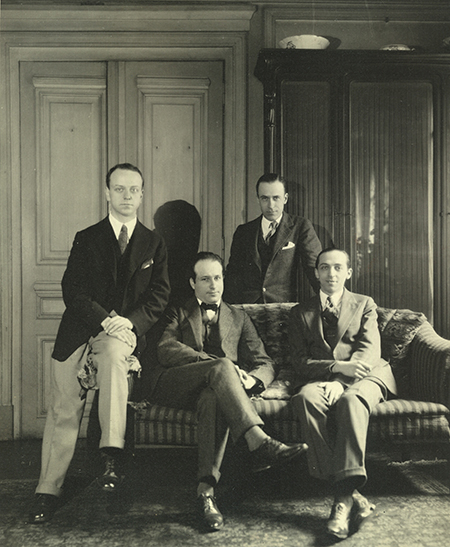by Jarrett Hoffman

A 12pm Brownbag Concert at Trinity Cathedral will feature soprano Jacqueline Josten and mezzo-soprano Kira McGirr (pictured) in duets from Monteverdi to Mozart. A freewill offering will be taken up.
IN CLASSICAL MUSIC NEWS:
Last week in an article by Sammy Sussman for New York Magazine, hornist Cara Kizer shared details of the evening of July 24, 2010, when she was a member of the New York Philharmonic and the ensemble was in residency in Vail, Colorado. She alleges that she was drugged by oboist Liang Wang and raped by trumpeter Matthew Muckey, both of whom were her orchestra colleagues at the time. A Vail police officer recommended that charges be filed, but the Fifth Judicial District Attorney’s Office declined to prosecute.
In 2018, the Philharmonic contracted an independent investigation into this and other allegations against Wang and Muckey, which resulted in their firing from the ensemble, only for a challenge from the musician’s union and a ruling by an independent arbitrator to force their rehiring.
This week, the Philharmonic announced that Wang and Muckey “would not take part in rehearsals or performances for the time being after a magazine article detailed the allegations of misconduct that had been made against them,” as Javier C. Hernández writes for The New York Times.
Read the New York Magazine article here.
ANNOUNCEMENTS:
Ohio Arts Council will present a free webinar tomorrow, April 18 at 2:00 pm focused on how to navigate the arts education landscape. “Join Daizha Brown, policy analyst at the Arts Education Partnership (AEP), as she offers insights on arts education policies, shares valuable resources available from AEP, and shines a light on where and how to find connections and support systems within the arts education community.” Learn more and register here.
Kent State’s Glauser School of Music welcomes two new faculty members: director of choral activities Matthew Swope and director of orchestra Isaac Terceros. Read more here.
TODAY’S ALMANAC:
by Daniel Hathaway

Born in Minneapolis, after studies with Ernest Bloch, Elwell was among the first American students of Nadia Boulanger in France along with Aaron Copland, Walter Piston, and Virgil Thomson (pictured chez Boulanger, L-R: Thomson, Piston, Elwell, Copland). He joined the composition and theory faculty at the Cleveland Institute of Music from 1928-1945, then taught at the Oberlin Conservatory for nine years.
Among the orchestra conductors who championed Elwell’s orchestral compositions were Rodzinsky, Stokowski, Steinberg, and Hanson, and he was awarded the first Cleveland Arts Prize for Music in 1961.
Elwell served as music critic for the Cleveland Plain Dealer from 1932-1964, and participated in the University of Southern California’s Project for the Training of Music Critics, a program that brought dance and music critic Wilma Salisbury to The Plain Dealer. Salisbury wrote Elwell’s bio for the Arts Prize, which is full of pithy Salisburyisms.
In his Sunday columns for the Plain Dealer, which he served as music critic for 32 years, the composer praised the soprano [Marie Simmelink Kraft] so effusively that executive editor Philip W. Porter once admonished him to stop making love to Mrs. Kraft in print. Elwell impishly replied, “Would you prefer that I make love to her out of print?”
During the reign of George Szell, Elwell did not hesitate to take the imperious music director to task. In one review, he described Szell’s Germanic interpretation of Debussy’s La Mer as Das Mer.
One of Elwell’s earliest pieces, Quintet for Piano and Strings (1924), won more praise in Paris than George Gershwin’s Rhapsody in Blue, which was premiered on the same concert.
One of the most enduring images of Elwell was penned in 1964 by a Plain Dealer editorial writer, who characterized him as “raconteur, linguist, teacher, and, although Minneapolis-born, possessor of a certain Old World charm that gives a vague impression that he is carrying a walking stick and wearing an Inverness cape. Herb Elwell . . . a man apart.”
Salisbury’s bio of Elwell notes that
Following his death in 1974, Elwell’s widow Maria gave his manuscripts, published scores and papers to the Cleveland State University Library. In 1979, the catalogued materials were made available via the On-Line Computer Library Center.
Enterprising scholars, conductors, and performers should have a look at the collection — if they can find it. A search today proved elusive.
While looking, click here to listen to what is said to be one of Elwell’s most popular scores, the suite from his ballet The Happy Hypocrite (1925) as performed by the Cleveland Pops Orchestra conducted by Louis Lane “from a long out-of-print LP released in 1961 and never transferred to CD. At the time of this recording, the Cleveland Pops Orchestra was essentially the same as the Cleveland Orchestra.”



